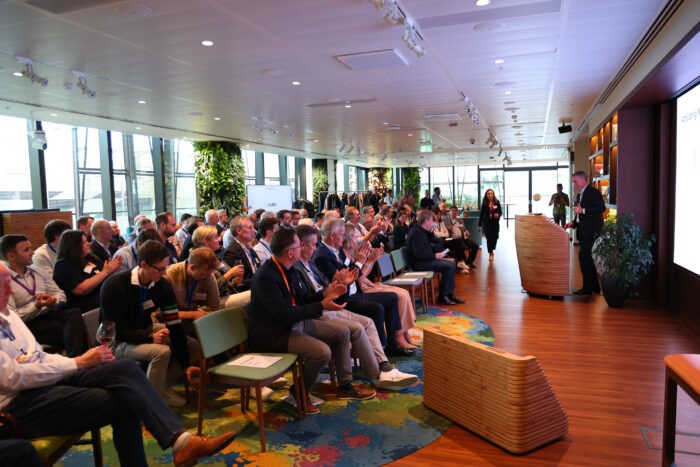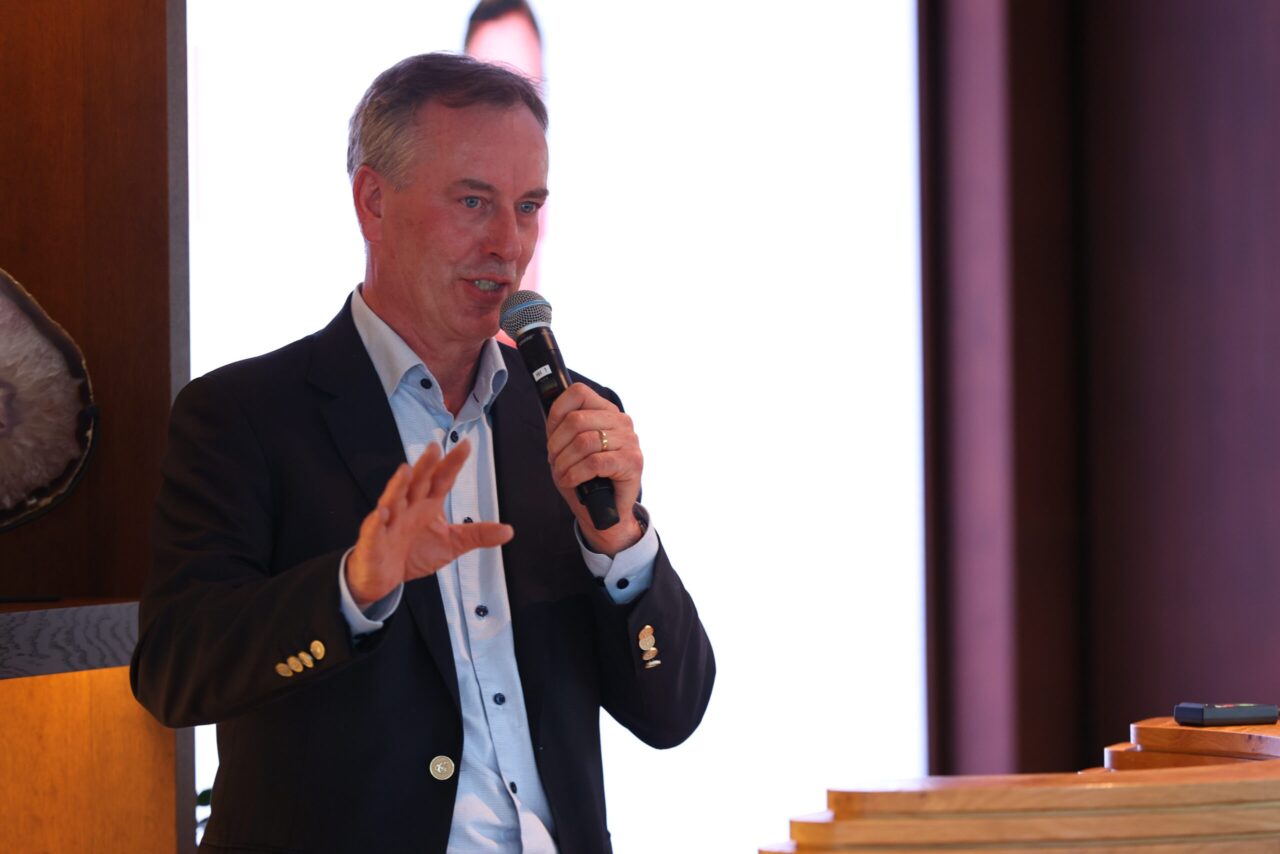John Flynn joined Act Venture Capital in 1996, two years after it was founded.
Since then, he has helped navigate the venture capital firm through some of the most turbulent and transformative periods in business — both domestically and internationally.
From the highs and sudden crash of the dotcom era, to the global financial crisis, recessions, a worldwide pandemic, and the ever-evolving landscape of technology, Flynn has lived – and invested – through it all.
Since its establishment, Act has invested in 130 tech companies and sold 82 with a collective enterprise value of €4.6 billion. Flynn has been central to the vast bulk of those deals.
This front row seat has given him a deep sense of perspective – on the issues facing Irish companies and the issues facing Ireland.
And, as he launched Act’s inaugural ‘Alumni Event’ last week, Flynn reflected on what he sees as some of the key issues facing companies and investors right now- from artificial intelligence to growing geopolitical tensions.
The way Flynn sees it, the landscape has changed dramatically in the three decades since Act deployed its first investments. IPOs and public capital markets have been overshadowed by private capital, he told a room full of Act alumni in Salesforce Tower in the heart of the city.
“Founders no longer need to sell their companies to achieve liquidity for themselves and their stakeholders,” he said.
“Five years ago, growth and majority-type financial buyers were not a preferred route to liquidity. It was always seen as a discounted outcome to a clean trade sale. For most companies, trade sales are still the best option and the backbone of any venture portfolio,” he said.
Flynn pointed to Act portfolio companies Decawave and SilverCloud as examples of successful trade sale exits enjoyed by the 30 year old VC firm Decawave, a semiconductor firm, sold to Quorvo, the Apple supplier of radio frequency solutions, for $400 million, while Silvercloud, a digital health company, was sold to US telehealth group Amwell for $250 million.
“Another great example is Workday, which currently employs over 2,000 people in Dublin and its origins here are the result of the exit of Cape Clear, which we backed from seed through to scaling stage,” he said.
However, he said he did not believe he was the only person in the room who believed such exits are always “bittersweet” and that there was always a lingering question of what could have happened if the companies continued their independent journeys.
“This is where financial buyers of scale come into play,” he said, pointing to Cubic Telecom and Dublin tech security firm Ekco, both of which were backed by Act.
“Both businesses went on to deliver liquidity by attracting significant external capital at enterprise values of up to $1 billion, all the whilst remaining in the hands of their hard-working founders,” Flynn said.
“Without being sold, they continue to present long-term opportunities for Ireland. This conforms to my definition of impact investing.
“We want to encourage more Founders along this route to build enduring, Irish-founded, Irish-headquartered, multinational companies.”
The state of the market
Speaking to the new alumni network, Flynn also picked out some key themes and trends that he believes are central to the evolving business landscape.
The first, unsurprisingly, was AI.
According to Flynn, it has been largely a “top-down” market up to now, with hardware and foundation models funded and led by Big Tech.
He believes that large language models are likely to commoditise in 2025, but the “Agentic AI” and “Digital Workforce” applications they will unleash will create an exciting platform for a wave of “bottom-up” new companies that will provide a phenomenal VC opportunity over the next five to ten years.
“So, what does that mean?” he asked.
“There is unlimited capital available for the best AI deals. But it is concentrated and therefore a tougher market for non-AI companies, exemplified by the volume of Series A transactions being down 80 per cent in US for Q1 2025.”
Flynn said that innovation cycles always speed up and AI is no exception. “Speed has always been core to the playbook for building start-ups and in this AI cycle, hyper execution and founders with a real sense of urgency will be key,” he said.
Flynn said that all companies will need an “AI narrative” – either as a “Native AI company” or as a company “utilising its efficiencies”.
Flynn also talked about the current geopolitical tensions and the uncertainty caused by Trump’s tariff policy.
He said the turmoil had created a focus on supply-chain restructuring, and, in many cases, caused investment and exits to pause.
“We’ve seen a Public market U-turn after the US election high,” he said adding: “Now, still in Q2, we’re maybe into a W-shape market as Tariff and Global Trade Deal volatility reigns. Maybe.”
“I believe Europe and Ireland are at a precipice. It is obvious that the current shift away from globalisation towards regionalisation presents some real trading and growth challenges. We will have to wait to see how these get resolved, but I believe there are silver linings which translate into massive opportunity.”
Massive opportunities
In his address to the inaugural alumni event, Flynn highlighted five opportunities for Ireland in the current market.
The first, he said, was critical mass. “European & Irish VC markets are 10x bigger than in previous financial and dot.com crises. We – founders, VCs and LPs are all more ambitious, more capable and more experienced,” he said.
Secondly, he said that Ireland and Europe were at a cohesion moment and that Europe was good in times of crisis.
“The EU exists because of WWII, and the 10x growth happened post-financial crisis in 2008 when Governments backed innovation. Recent events mean we are now acting on the Draghi Report and there are massive opportunities in core resilience sectors, with Energy, Security, Health tech and other Deep Tech sectors being particularly ripe to build upon,” he said.
Thirdly, he said that he believed that the supply chain restructuring is more of a concern for larger companies and that it actually presents an opportunity for start-ups to infiltrate and win share “in these times of flux”.
In his fourth point, Flynn said that Ireland needs to take advantage of the changing US Market. “The DOGE initiative presents a catch-up opportunity. Silicon Valley’s key value foundations of immigration and research are being reset. “In a time of rapid change and faster innovation cycles, with the right policies, Ireland can extract critical founder talent,” he said.
Finally, he said that private capital continues to innovate, providing better solutions for growth. “US capital is still global capital and will still seek out the best opportunities. This needs to be grasped, and most importantly, built upon locally,” he said.
The importance of the network
The event was organised to launch the new Act alumni network. Flynn said that Act has a massive network of investors, founders and business leaders, and it was a case of pulling the various strands of it together for the betterment of all.
“We now want to energise this ‘network’ and augment it from being a ‘Point-to-Point network’, where Act connects the dots into a ‘Mesh network’, where relationships between new and existing founders can be formed with a view to adding further and more efficient value,” he said.
He added: “ We believe that this will be a win-win for both the companies and the Network. This is already a growing trend for us where we are excited to work with repeat Act entrepreneurs in 5 new companies over the past few years.”
He said the network will be good for the firm’s portfolio companies and the Irish start-up ecosystem. “We believe it will lead to advisory roles, non-executive director roles, co-investment opportunities and full-time opportunities for our exited network,” he said.
“ It will provide different things for our portfolio depending on stage, whether it is helping our seed founders capture what I call the ‘first 10’ – customers and hires – which are essential to setting the course and culture, or for our later stage companies, it could be refining pricing or distribution, entering new markets or planning exit routes.”

Salesforce as a “North Star” for Irish start-ups
Act joined forces with Salesforce for this event. Salesforce, as the second largest enterprise software company in the world, is a “north star” for Irish indigenous technology businesses to emulate. The Act team considered there to be no better company to demonstrate Act’s ambition for its current crop of Irish start-ups.
Niamh McArdle, the head of SMB sales with Salesforce in Ireland, shared the story of how Salesforce had opened an operation in Ireland. Salesforce Ireland opened in 2000, just one year after Salesforce was founded in San Francisco. David Dempsey saw an article in a business magazine about how she recalled “This bold, ambitious US company in San Fran that had these great ideas about making software as accessible as possible. And what did they do? They were curious and they were intrigued, and they sent an e-mail to our CEO, Marc Benioff, and they said – we like this idea, let’s talk. And Salesforce Ireland was opened, just one year after Salesforce was started. So, we were the first location outside the US to be open.”
“It’s pretty remarkable and incredible that an email sent all those years ago has had such a lasting impact on our legacy and our presence here in Ireland,” she said. McArdle also highlighted the importance of having a strong data and AI strategy in today’s tech-driven era and the rise of digital labour. She explained how Salesforce’s latest innovation – Agentforce – is designed to help companies unlock the potential of AI over the coming decade. “Today with Agentforce, no company is better positioned to help companies realise the promise of AI over the next decade,” she said.
Next generation leaders
The event was wrapped up with three of Act’s portfolio companies being interviewed by Tom Lyons from The Currency: Stuart McGoldrick of Spectrum.Life, Michael Ryan of GridBeyond and Donal O’Shea of Deciphex. Act has backed these businesses from early stage through multiple funding rounds creating large businesses with revenues of €30 million to €100m this year and growth rates of 70-100 per cent per annum. All are at stages beyond the typical exit stage for Irish companies; have significant scaling ambitions and the potential to be global leaders in their respective markets.
The event was sponsored by Salesforce and Dentons, partners of Act Venture Capital and its Alumni Network.


